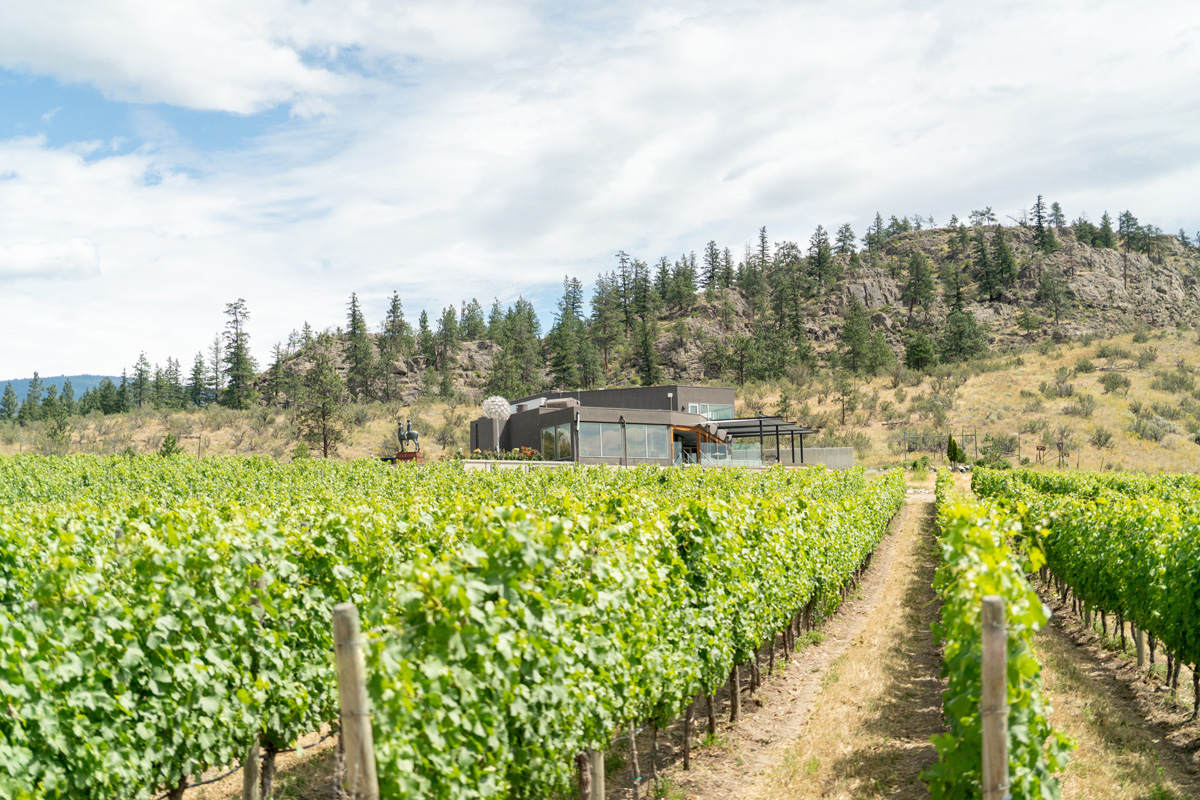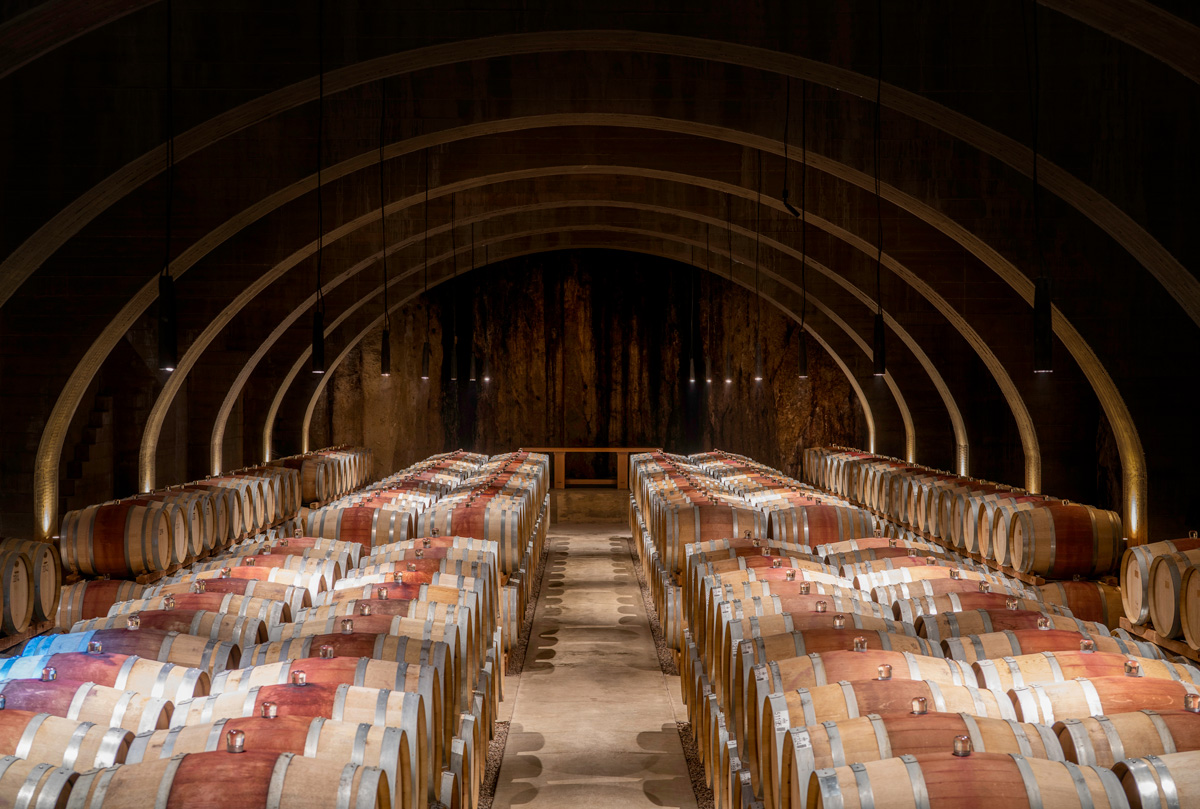
Wine Culture Magazine

Merlot is the most widely planted red grape in British Columbia. Jon Adrian photo courtesy of Blasted Church Vineyard.
“If anyone orders Merlot, I’m leaving. I am NOT drinking any f***ing Merlot!”
With those words, Miles Raymond, played by Paul Giamatti in the 2004 movie Sideways, condemned one of the planet’s finest wine grapes to more than a decade of ignominy. And unfairly so—Merlot is, after all, one of the world’s most popular varieties, the most widely planted red both in Bordeaux and here in British Columbia (though Cabernet Sauvignon is the most widely planted worldwide), and the key ingredient in some of the world’s finest, most expensive wines, including the loftily priced Château Pétrus, which is 100 per cent made from Merlot.
That’s something to celebrate this International Merlot Day. It’s been marked on November 7 every year since at least 2011, though no one is sure how or why it got its start. Maybe it was in reaction to all those other people who were NOT drinking any f***ing Merlot. Who knows?
In any case, Merlot is one of Bordeaux’s original grapes, emerging around 100 AD, not long after the Romans introduced viticulture to the region, and mainly grown on the left bank of the Gironde River, especially in Médoc. It is dark blue, almost black in hue, its name thought to have evolved from “merle,” the French word for “blackbird.”

Merlot is known for its smooth flavour, medium body, medium acidity and medium tannins. Photo courtesy of Liquidity Vineyard.
Bordeaux wines first became internationally popular in the 12th century when Eleanor of Aquitaine, whose lands included Bordeaux, married Henry II of England and introduced her home-grown wine to the British Isles. But Merlot itself likely wasn’t officially recognized as a grape until around the 18th century, when it first appeared by name in documents found in Bordeaux.
Today, Merlot is one of the six approved red grapes in Bordeaux (along with Cabernet Sauvignon, Cabernet Franc, Petit Verdot, Malbec and Carmenère, although with climate change new varieties like Touriga Nacional are also being considered). And it is grown the world over, in California, Washington, Chile, Australia, South Africa, Greece, Mexico, Italy, Israel and, of course, here in Canada.
Merlot is known for its smooth flavour, medium body, medium acidity, medium tannins that tend to be soft and supple, and smooth finish, which can lead some of the snobbier wine lovers to dismiss it as perhaps a little too easy drinking.
But it can also exhibit wonderfully complex flavours of dark fruits such as black cherry, blackberry, ripe plum and black raspberry, along with notes of vanilla, chocolate, mocha, dried herbs such as sage or thyme, and even a rich earthiness.
Depending on where Merlot is grown, other characteristics can appear—in cool climate Chile or France, it will be earthier, leaner and more structured; in hotter regions, like California, it will be lusher, fruitier and more likely to spend time in oak.

A cellar full of Merlot barrels at Mission Hill. Supplied photo
Not too surprisingly, Merlot is also an easygoing food wine, easy to pair with tomato-y pasta dishes, flavourful cheeses like gorgonzola or cheddar, hearty vegetables like eggplant and zucchini (think: ratatouille) and grilled meats, especially pork, beef or lamb. Its softer tannins and richer fruit notes can handle smoky, even spicy flavours, though its low acidity makes it less of a good companion for vinegary salads or rich, creamy sauces.
That’s good to know if you plan to serve a meal in celebration of International Merlot Day, which you probably should. You can also observe the day by taking part in tastings and specials offered by liquor stores, bars and restaurants—or even host your own tasting, trying Merlots from different countries and regions.
Or why not watch a movie that features Merlot? Aside from Sideways, that could include A Walk in the Clouds, Bottle Shock, A Good Year, Somm or Uncorked.
Whatever you do, share your adventures on social media with the hashtag #InternationalMerlotDay—and definitely drink some f***ing Merlot.

Mission Hill Family Estates Desert Ridge Vineyard Merlot 2021
(Osoyoos, B.C., $61) From a legendary vineyard; ripe black plum, mocha, sagebrush; complex and elegant.

Liquidity Estate Merlot 2020
(Okanagan Valley, B.C., $36) Blackcurrant, blackberry, black tea, cocoa; balanced and versatile.

Blasted Church Renaissance Series Merlot 2021
(Skaha Bench, B.C. $34) Ripe red berries, leather, chocolate, just a hint of baking spice. Rich, smooth, lush.

Joanne Sasvari is editor of Vitis and The Alchemist magazines. She also writes about food and drink for WestJet and Vancouver Sun, and is author of the Wickaninnish and Vancouver Eats cookbooks.

Joanne Sasvari is editor of Vitis and The Alchemist magazines. She also writes about food and drink for WestJet and Vancouver Sun, and is author of the Wickaninnish and Vancouver Eats cookbooks.
Copyright © 2025 - All Rights Reserved Vitis Magazine